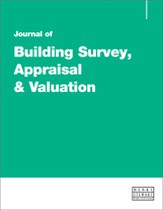The failure of the agreed surveyor role : Section 10(1)(a) of the Party Wall etc. Act 1996
Abstract
This paper discusses how and why the agreed surveyor role, Section 10(1)(a) of the Party Wall etc. Act 1996, has failed. The Act has its flaws but is perfectly fine; it is those who administer it who contribute to the failure of this unique and impartial role. Those who administer the Act stand to benefit financially if there are more appointments. For the collective party wall community, it is far more lucrative if disputes are resolved by two surveyors, as opposed to one ‘agreed’ surveyor. There is the false perception that having a dispute resolved by two surveyors is more sensible than relying on just one; however, of 66 party wall appeals from 2002, not one of them related to an agreed surveyor award. Of course, there may be times when a dispute is best resolved by party-appointed surveyors, but that must be after the agreed surveyor route is considered and found to be inappropriate. Too often, this consideration is overlooked, and disputes are needlessly resolved by party-appointed surveyors, ensuring the building owner pays more. There are many simple steps that can be taken by surveyors administering the Act, from serving more informative notice packages to banning pre-dispute appointment letters. The problem with any recommendation is that a surveyor may understandably be reluctant to bring about changes that can adversely affect their profitability. It is the fault of party wall surveyors as guardians of the Party Wall Act that the role of the agreed surveyor has been an abject failure. This paper will explain why they are at fault, why they are loath to change the status quo, and lastly, for the ethical surveyors out there, how they can put the special role of ‘agreed surveyor’ on the pedestal it deserves.
The full article is available to subscribers to the journal.
Author's Biography
Ben Mackie is a surveyor specialising in the Party Wall etc. Act 1996. He is the Director at The Party Wall Collective and a chartered construction manager. Ben has resolved thousands of disputes under the Party Wall etc. Act 1996 and is a member of the Chartered Institute of Building (MCIOB), the Faculty of Party Wall Surveyors (MFPWS) and the Pyramus and Thisbe Society (MPTS). He has a BSc (Hons) building surveying degree (2:1) with UCEM and is an accredited mediator. Ben’s experience as a police detective held him in good stead when it came to working with the Party Wall etc. Act 1996, which he has specialised in for 12 years. He has published two books of party wall articles, making them free for all, with contributions from a judge, two leading King’s Counsels and the President of the Faculty of Party Wall Surveyors, among others, as well as his own articles, including one titled ‘The Impartiality Myth’. Ben has been published in the prestigious RICS Modus and The Philadelphia Enquirer. He is the founder of the Party Wall Clinic, a monthly online session where party wall surveyors have access to a panel of experts to seek assistance on their party wall jobs.
Citation
Mackie, Ben (2025, June 1). The failure of the agreed surveyor role : Section 10(1)(a) of the Party Wall etc. Act 1996. In the Journal of Building Survey, Appraisal & Valuation, Volume 14, Issue 1. https://doi.org/10.69554/PHRO3818.Publications LLP
